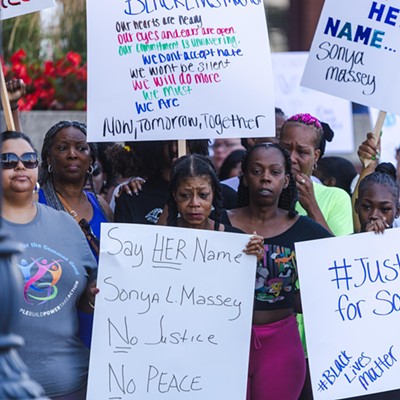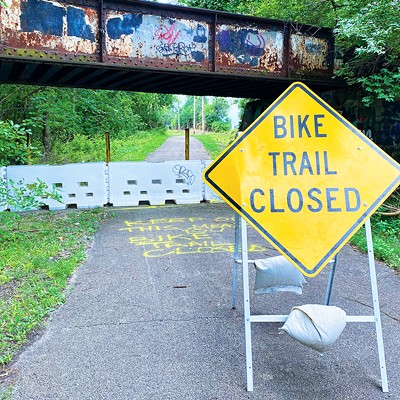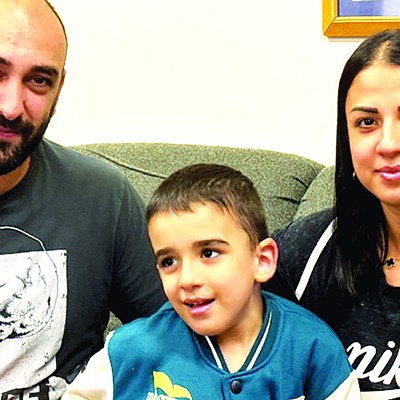The new mayor will have his hands full. The police department and the self-insurance fund will be immediate concerns. But what about the Eastside of Springfield? A recent city-funded study outlined many of the problems there, including sections of urban decay comparable to the worst parts of Chicago. Between 14th and Dirksen, Cook and South Grand, the consultants found 828 properties--nearly half of all the parcels or buildings--vacant, boarded up, or deteriorating. Commercial and residential projects are in the works, but at least one proposal for large warehouses has been criticized as poor city planning by area homeowners. Several not-for-profit organizations and neighborhood associations are sprouting up to address many of the community's issues, but their leaders are concerned they're all competing for the same, limited grant money.
The mayoral candidates are talking about plans for quick demolitions and redevelopment and jobs, but neither candidate has proposed a comprehensive plan to transform this troubled part of town. This, in itself, isn't worrisome to Eastside leaders, who have plenty of their own ideas to offer. But their expectations for the new mayor are guarded. It's not that they aren't optimistic. They just say that both Tony Libri and Tim Davlin have a lot to learn.
"In December 2002, the city completed a comprehensive study on economic development for the Eastside," Tim Davlin stated in an Illinois Times survey distributed to candidates during the primary. "My feeling is that we shouldn't reinvent the wheel in looking for new ideas--we should apply the ideas that have been proposed. I'll focus on the 'Eastside Redevelopment' study to guide my efforts in this area." That study, Eastside Neighborhood Development Plan, was conducted for the city by PGAV Urban Consulting from St. Louis. It is available online at www.springfield.il.us. Among the study's many proposals are ideas for attracting more businesses and government offices to the Eastside, redeveloping the Cub Foods and JC Penney area into a unified shopping complex, scaling back commercial development on Cook Street, and implementing a large-scale housing rehab plan. Davlin has also proposed stricter code enforcement and smart-growth concepts such as creating more green space.
In the same survey, Libri touted his economic development plan, which focuses on what he calls Springfield's "B-L-T" industries: biomedical, logistics (warehousing and distribution services), and tourism. He also has a "Quick Finish" plan that would streamline the demolition process and allow "groups or individuals to take ownership of property that can be repaired and occupied." In a debate, Libri estimated that several hundred dilapidated homes can be provided to low-income or even homeless residents, with hardly any repair costs. Libri also wants to improve city code enforcement and fee collecting, especially in regard to owners of boarded up and dilapidated housing.
Here are a few Eastside leaders who will share their own ideas for Eastside renewal, their thoughts on the mayoral candidates, and what they expect from the winner after he takes office this May.
Michael Pittman
Since the mid-90s, Michael Pittman has been one of a very few for-profit developers on the Eastside--he admits the profit margins are "very thin." In addition to his homes and subdivisions, he's responsible for raising several commercial buildings, which host state agencies, a restaurant, a bank branch, the Illinois Coalition for Domestic Violence, and several other organizations. A future project includes a combined loft-style apartment complex with commercial space on 11th Street. Lately, he says, he's been pulling away from residential development as more not-for-profit organizations take it up.
Though he's certainly interested in making money, Pittman says that, ultimately, his involvement in the Eastside is more like a spiritual calling. "If it was all about the money, I'd be gone a long time ago, or I would have started up a liquor store."
Pittman says he attended a mayoral debate a few weeks ago that focused on housing issues. He was curious whether Libri's plan to provide homes for homeless people is workable. He also recalls Davlin's reference to the Eastside Neighborhood Development Plan. "The study hit the nail on the head," Pittman says. "I agree with about 95 percent of it, except where it discourages commercial development on Cook. I do like the fact that both candidates have expressed an interest in the Eastside and cite it as an undeveloped area. They're going to step into something that's been an age-old problem."
There are two things Pittman would like to see the new mayor do upon taking office. "First, he needs to get the Eastside leaders together. I use 'Eastside leaders' loosely, because you have to do it without hurt feelings. The new mayor needs to have an Eastside town hall meeting and establish trust. Second, for the new mayor to show that he cares about the Eastside, he has to want to make change. The new mayor should ask 'What can I do to help you?' and work hand-in-hand with the residents.
"There's so much to do on the Eastside. Where do you start? If you start with housing, you have to market to more than 12 percent of the African-American population in Springfield, 70 percent of which are single-parent mothers. Half of the rest have credit problems. The really sad part is that a lot of [credit problems arise from] greed and taking advantage of people. But you have to have diverse neighborhoods, so how do you attract more people with money to move in?
"I've been real critical, but churches need to get more involved. They have the capacity to bring about change. They have a captive audience. There are church members who need houses. A church can buy a dope house and clean it up. A church can establish a credit union. Five guys can get together and start a Dairy Queen. Everybody should work together. You can't expect the government to do everything. There are certain things you have to do yourself."
Ron Fafoglia
Ron Fafoglia is executive director of the Springfield Project's HOPE program, which is building energy-efficient homes, blocks at a time, on the Eastside. Currently, HOPE is razing eight homes in the 1300 block of East Jackson to make way for ten new homes that, with the help of grant money, will sell for about $40,000 less than what it cost to erect them. Before taking on the HOPE program, Fafoglia ran a hardware store in Springfield for 30 years.
The Springfield Project-HOPE sponsored the housing forum that Pittman attended, where Libri and Davlin discussed plans affecting the Eastside. "What they said was important," Fafoglia says, "but the impression that most people got from the discussion was that the candidates need a lot of education in terms of housing issues. They simply don't understand the scope of the problem." Fafoglia doesn't place as much importance on the recent Eastside study as Davlin and Pittman do. "The study points out problems, but I wouldn't endorse every aspect of it," he says, adding it would be a waste to invite businesses to the Eastside only to board them up.
Fafoglia referred to Libri's plan to give a homeless person a house. "He just didn't understand the condition of the housing. Just the scope of the problem on the Eastside is huge. While I think both candidates would like to address the problems, I don't think they noticed the depth of them.
"The credit problem is huge. I'm building ten houses, and haven't done anything in terms of marketing. Yet I've already had 30 applicants and only a couple will qualify because they're the only ones with good credit. It's so easy to say the city can't do anything with that. What we need is a proactive campaign that teaches people that their credit record follows them their whole lives, even if the information stays in it for only ten. If you're 19, it's not so important. But by the time you're 29, you're married and you can't buy a house or a car." Fafoglia also said the city can do more to crack down on predatory lending practices.
"Both candidates touched on code enforcement, which is extremely important. There are so many code violations on the Eastside. You know it's a code violation without even knowing the code."
But even the codes on the books are sometimes not all that helpful, Fafoglia says. "There's a house on the Eastside with 13 cars in the backyard. It's OK because the house has a privacy fence. Well, it's not OK. It's a junkyard in the middle of a residential neighborhood. You have to have a concentrated effort with participation by the city--more than just cosmetics--to have code changes. As a former businessman, I know you go where the money is. You can't put a business in the middle of a dilapidated area. First you revitalize the neighborhood and business is going to come. Look at the west end. It was developed and businesses came."
Fagolia says the new mayor needs to coordinate all the groups involved on the Eastside--the Springfield Project, the Urban League, churches, etc.--so that they can share grants and resources rather than compete for them. "It's not for a lack of effort that Eastside improvement has been slow," he says. "It's been a lack of coordination."
Bev Meek
Bev Meek is Bank One's vice president of community investment for central Illinois. She also chairs The Springfield Project's HOPE program. Bank One is helping finance the TSP-HOPE's homes on East Jackson.
Meek also attended the housing forum and agreed with Fafoglia about the candidates' knowledge of the Eastside. "One thing we learned from them is there's a lot they didn't know about the Eastside," she says. "But it's reflective of what people in Springfield think."
Libri's plan for taking a dilapidated home and giving it to a poor person at little or no cost exposed his lack of knowledge, she says. "Very few homes on the Eastside can be rehabbed. My experience is that the homes are very aged. We haven't found many houses that didn't require substantial amounts of rehab. In fact, rehabilitation is often cost-prohibitive." TSP-HOPE is spending about $100,000 per new home, which it intends to sell for about $60,000. Part of the cost includes tearing down homes that were already there but too far beyond hope for restoration. Revitalizing one side of an entire block, therefore, can cost several hundred-thousand dollars, though some of that money will be recouped when the houses are sold.
Like the candidates, Meek wants stricter enforcement of city codes. She wants the new mayor to bring all the nonprofits together and find a way to divvy up all the funding sources and find new sources too. "One mistake a new mayor could make is to not include the nonprofits, the developers, or the banks when drafting plans for the Eastside." She suggested that the new mayor find a new city planner. "One thing we need is a good planner," she says, "who could ensure development all over the city." She also expects the mayor to be involved in job creation on the Eastside.
Meek acknowledges that involving more developers and financial institutions won't be easy. "There are only a few developers interested in working on the Eastside," she says. "And for the banks, there are lots of risks. The banks need to know that the city and the developers are behind us. They need to know what is happening to that area. The city can only benefit everyone to do this. Otherwise the Eastside of Springfield is going to end up more like East St. Louis."
Silas Johnson
Silas Johnson is pastor of Calvary Baptist Church, 2208 Kansas Street, and head of the Ministerial Alliance, a group of mostly Eastside pastors. The alliance, while fighting for relevancy, has stepped into issues once largely ignored by the African-American community. Last Spring, for instance, it decided to publicly support a property tax increase for School District 186. Its members are involved in tutoring projects, including one that is a last-chance program for expelled students. Calvary Baptist, through its Nehemiah Expansion Corporation, runs an affordable day-care center and is planning to build a 25-home subdivision on the Eastside.
Johnson says he's familiar with Libri's and Davlin's plans but would like them to focus as much on job creation as on housing problems.
"We need productive jobs for skilled individuals who might not have a college degree but are good with their hands and can learn very quickly how to operate machinery. Even if we could get some factories," Johnson says.
It would mean a lot, Johnson says, if the new mayor considered appointing Eastside residents to important city positions. "They should be qualified, of course, and not just to make the Eastside happy but to have people who represent every part of the city.
"Within the first year, I would like to see the mayor have in place operational plans--not just talk--about building affordable housing, about bringing codes in place, about an economic development office, not just a whole lot of talk but visible plans about how to do deal with the Eastside. Even though [the candidates] know the problems, I think the first thing they should do is bring them to the forefront of what they're going to do. And then to do it."



















